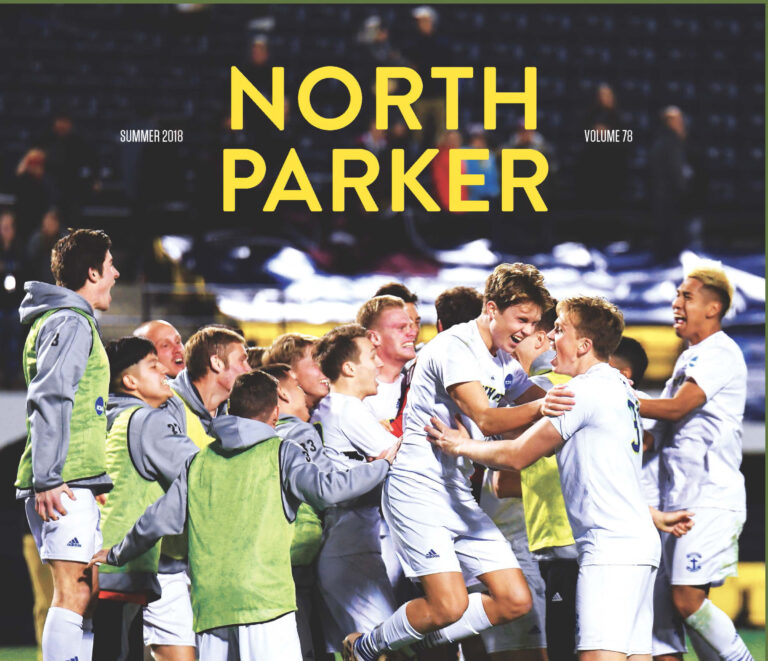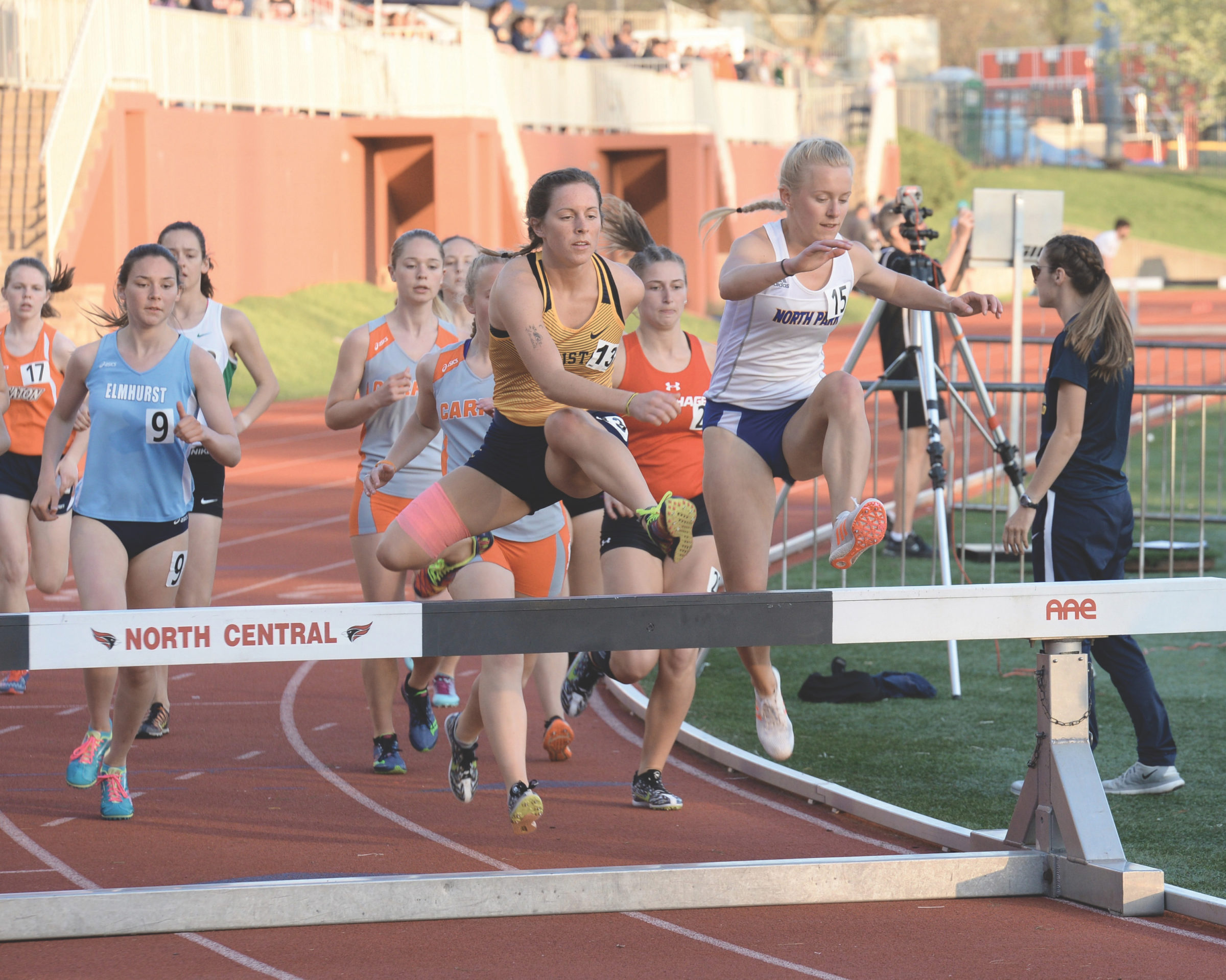
When Colin Lake C’18 arrived on ��ݮӰ��’s campus four years ago, the Michigan native didn’t know a soul. That changed on the warm September day he walked into his first basketball “open gym.”
“It was like family right away,” says Lake, of the instant bonding that happened with his Viking teammates. “It was great walking in the door and having connections from the start.”
Lake, who has been working at a Lombard marketing firm since graduation, is far from the only ��ݮӰ��er to make instant friendships through sports. Athletes from the men’s soccer and football teams to the women’s volleyball and rowing squads share a bond that goes deeper than the playing field.
“This is about more than sports,” says Director of Athletics Dr. Jack Surridge, who oversees ��ݮӰ��’s eight women’s and eight men’s varsity sports. “It’s about caring beyond the pitch or the field. It’s about long-term success: Personally, academically, spiritually. Everything.”
For student-athletes like junior Michael Freeze, a baseball player, teammates become like brothers, and coaches become mentors.
“For [Coach] Luke Johnson, it’s not strictly about baseball, but using baseball to make us better men, and eventually better husbands and fathers,” says Freeze of his coach, under whose watch the team has seen not only their record improve, but also their collective GPA.
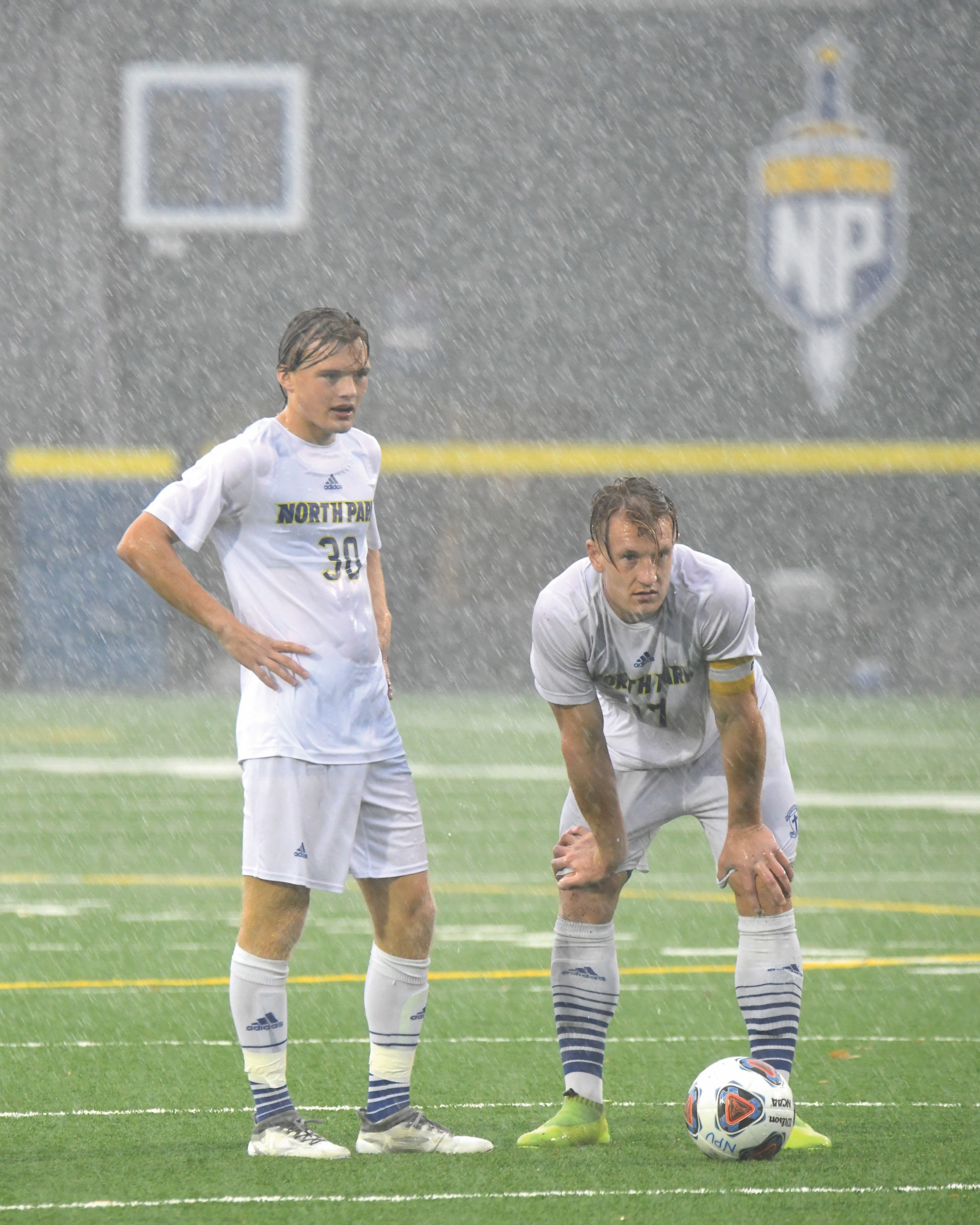
PITCH PERFECT: MEN’S SOCCER MAKES MEMORIES AT NATIONAL CHAMPIONSHIP Coach John Born will never forget his trip to last December’s NCAA Division III Soccer Championship in Greensboro, N.C.
Although there were plenty of memorable moments on the field for the 20-year head coach, his favorite took place before a single game was played, at the pre-tournament NCAA-sponsored banquet honoring the eight men’s and women’s teams playing in the Final Four.
At the last minute, the coaching staff learned about the dinner’s suit-and-tie dress code, and sprang into action.
“We didn’t know what they’d wear given the chance to dress themselves,” Born jokes.
So, Associate Head Coach Kris Grahn C’11 G’13 went to a discount tie shop and scooped up a couple dozen matching blue and gold striped ties, which the players wore with white shirts and dress pants.
“As we walked into the ballroom, all eyes turned to us, and you could hear a pin drop,” recalls Born. “I looked out and saw individual athletes from the other schools, in their suits and dresses. Then I looked at our group, smiling and in matching ties. And I saw a team.”
Alas, the Vikings would go on to drop the final 2-1 in a nail-biter against soccer powerhouse Messiah College, after defeating the University of Chicago in a dramatic shootout in their Final Four matchup. But the team’s appearance in the tournament was a high point for ��ݮӰ��.
President Carl Balsam was one of the many diehard Viking fans to make the trip to Greensboro.
“At the end of the contest, when the crowd was silent and the natural feeling of disappointment was palpable, our students and alumni broke into song, singing “I’m ��ݮӰ�� ‘til I die, ��ݮӰ�� ‘til I die. I know I am, I’m sure I am, I’m ��ݮӰ�� ‘til I die.” It was incredibly moving to sense the deep and abiding loyalty to this University,” Balsam recalls.
Indeed, this group of Vikings was special, boasting a diverse, international roster, with players from as far away as Sweden, Germany, Norway, and England, and as close as neighboring Von Steuben Metro Science High School. Others hailed from Chicago, Michigan, and Minnesota. The team spoke 12 different languages.
Despite the exotic mix of ingredients, the combination turned out to be the recipe for a perfect team. The Vikings entered Greensboro with an impressive 20-1-1 record, including a 19-game winning streak.
“��ݮӰ�� was not on many radar screens in September,” said D3soccer. com, which closely follows NCAA Division III sports. “Over the course of the season, however, the Vikings went from being unranked to embarking on a run that saw them finish as Division III runner-up to Messiah.”
D3soccer.com recently named Born Coach of the Year, and awarded senior midfielder Matias Warp Second Team All-America honors.
Reflecting later on the final game, Warp believes the Vikings simply ran out of time.
“If we’d had one more minute on the clock, I know we would have won,” says Warp.
Still, with many players set to return for the 2018 season, the promise of another championship appearance is very much a possibility.
“It’s one of those things where you get so far but not quite,” says ��ݮӰ�� Director of Athletics Dr. Jack Surridge. “I don’t think they’ll be satisfied until they go all the way.”
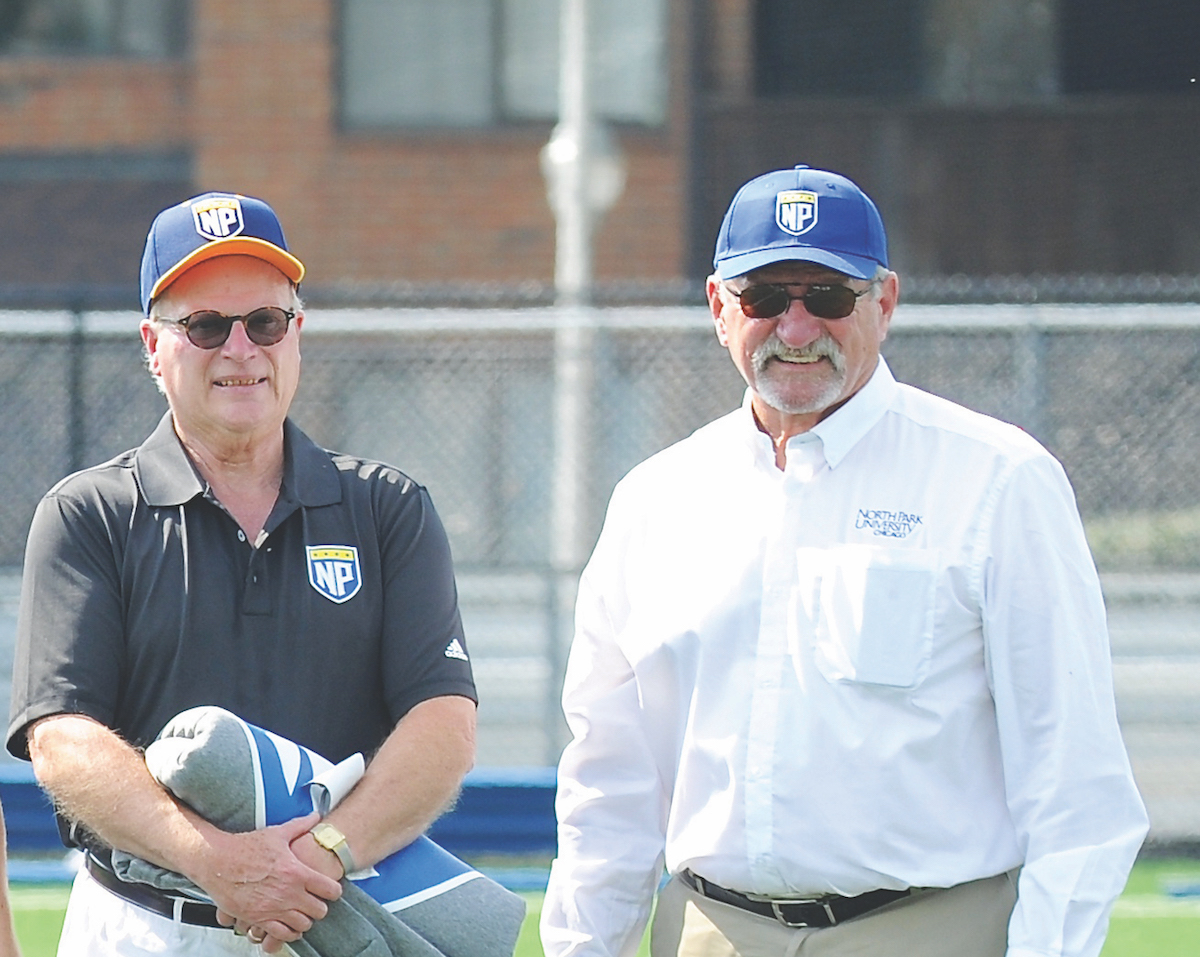
Surridge says the influence coaches have on student-athletes can be profound. “Coaches spend more time with these kids than almost anyone, so you really get some closeness there,” Surridge says. “We’re walking through life with them. And there’s a lot going on at this point in their lives. The wins are exciting, but for coaches, the most rewarding part is watching their players’ lives unfold.”
Coaches and teammates also serve as motivation to keep up grades, since low GPAs mean less playing time.
“The soccer team likes to take pride in having a high team GPA, so we hold each other accountable for not only our success on the field but in the classroom, as well,” says Ricky Pimental, a star defensive player who accompanied his team to Greensboro, N.C., for the National Championship last December.
Rather than distracting them from academics, many athletes say competing at the collegiate level has sharpened their organizational abilities and study skills.
“A lot of it is time management,” says volleyball player Lauren Wiltsie. “My teammates and I all have planners and we literally write down everything—due dates, meetings, tests, even the times I’ll have to leave for an away game.”
The discipline pays extra benefits postseason.
“Once the season is over, you have a lot of free time!” says Wiltsie. It helps, too, that ��ݮӰ�� has such small classes. It means “no hiding from professors,” says Lake. “At ��ݮӰ��, professors actually know who you are. And they will call us out if we’re not there.”
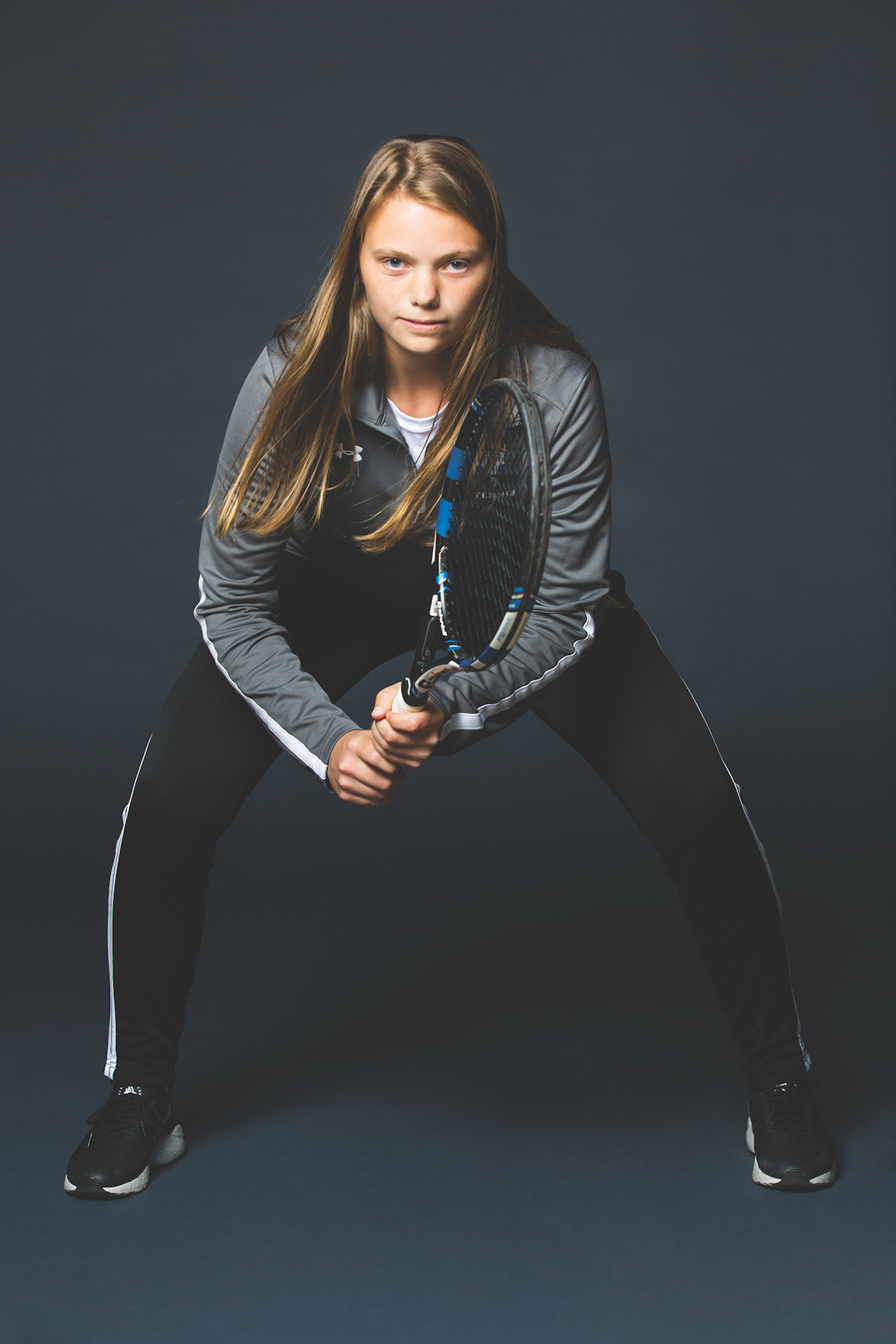
Stabekk, Norway
Physics Major
And they’ll also provide invaluable guidance. Vilde Olvin C’18, a tennis player, says it was Associate Professor of Physics Linda McDonald who convinced her to change her major from business to physics.
“She was very inspiring in terms of seeing a woman in science,” says Olvin, who plans to pursue an advanced degree in oceanography.
INTERNATIONAL INFLUENCE
Olvin, a Norwegian, is one of many athletes from Scandinavia, not surprising considering ��ݮӰ��’s Swedish roots. But as part of a drive to increase international enrollment— in the last decade, the percentage of international students has increased from 2% to 5%— coaches have extended recruiting efforts to different parts of the globe.
Take Vikings Football Coach Mike Conway, who has become known in the Polynesian nation of Samoa. While the tiny island (population: 197,000) has long been a pipeline for talented football players like NFL star Junior Seau, Conway was the first-ever college head coach to visit Samoa. Most Division I and II schools send recruiters instead.
His visit caught the attention of the Samoan government, which rolled out the red carpet for Conway, inviting him to do radio and television interviews about his trip.
In addition to recruiting several players, Conway, along with his family which includes ��ݮӰ�� alums Dakota C’16 and T.D. C’17, returned to Samoa to run a training camp for some of the country’s poorest kids.
“Seeing Dakota and T.D. lifting weights with those kids on their crude equipment was amazing. They were having so much fun,” Conway says. “It was ��ݮӰ��’s commitment to service in action.”
The trip lead to more recruitment in the South Pacific, with Conway taking a trip to nearby Guam in January 2018.
Now, ��ݮӰ�� has a thriving Pacific Cultural Association, which hosts an annual festival complete with native music and dance.
“Part of that is because of the focus on family that ��ݮӰ�� emphasizes,” says Surridge. “That certainly appeals to the family-centric people of Samoa and their neighboring islands.”
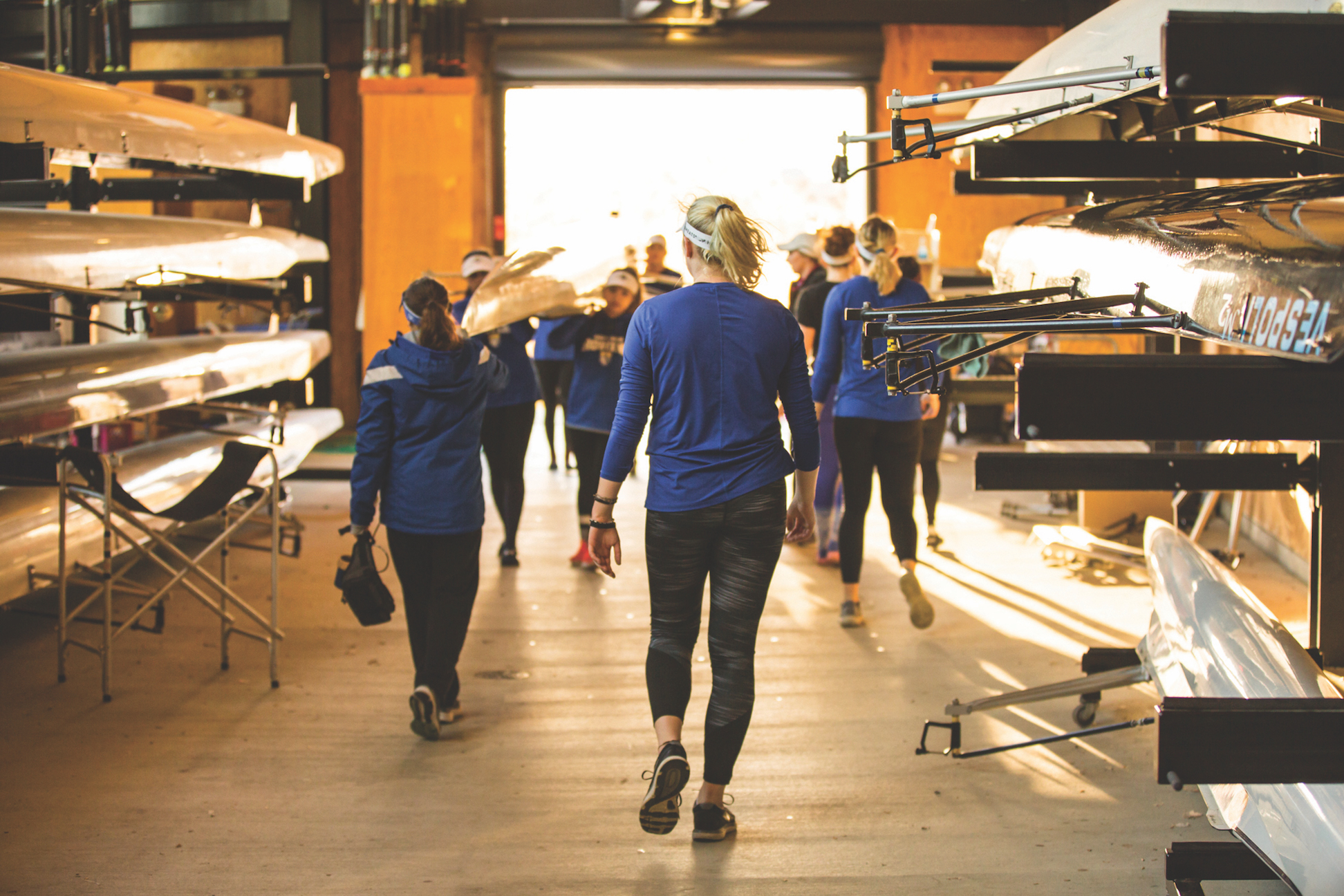
INVESTING IN THE FUTURE
Much has changed since Surridge arrived at ��ݮӰ�� more than 20 years ago and was asked by then-President David Horner to run the athletic department. At the time, Surridge looked at the school’s facilities, which paled in comparison to many suburban high schools, and laid it out to Horner: The school simply would not be able to attract top athletic talent with its aging facilities.
“I said ‘either we update our facilities, or we drop out of the CCIW [College Conference of Illinois and Wisconsin] and compete at a different level,’” Surridge recalls. “Horner said ‘over my dead body are we dropping out of this conference.’”
Fast forward a couple of decades, and ��ݮӰ�� now boasts the Holmgren Athletic Complex, a four-sport complex, recently resurfaced in time to host the NCAA Division III regional soccer tournament. The sprawling Helwig Recreation Center serves student-athletes as well as fitness and intramural play for the entire student body.
In partnership with the Chicago Park District, ��ݮӰ�� has invested substantial funds into the creation of an NCAA-compliant track and practice soccer field, and the boathouse and rowing facility at Clark Park, recognized by the American Institute of Architects for “excellence in architecture.” Men’s and women’s locker rooms have been totally renovated and, this summer, new tennis courts are being constructed at River Park, again in partnership with the Park District, to support our women’s tennis team.
All the investments have paid off, with Leaving the CWS Boathouse ��ݮӰ�� growing from 318 athletes in 2008 to 450 athletes in 2018, making them a force to be reckoned with in the CCIW.
What’s more, each one of those athletes will go out into the world as a ��ݮӰ��er, notes Surridge. Many of these athletes also come back to campus as proud alumni to cheer on today’s teams, offer internships to our students, or enjoy recognition as inductees in the Viking Hall of Fame.
For athletes like baseball player Freeze, being a ��ݮӰ�� athlete makes all the difference in the world: “I thank God every day that I have the opportunity to wake up and play the game that I love and to be a part of a team full of outstanding young men.”
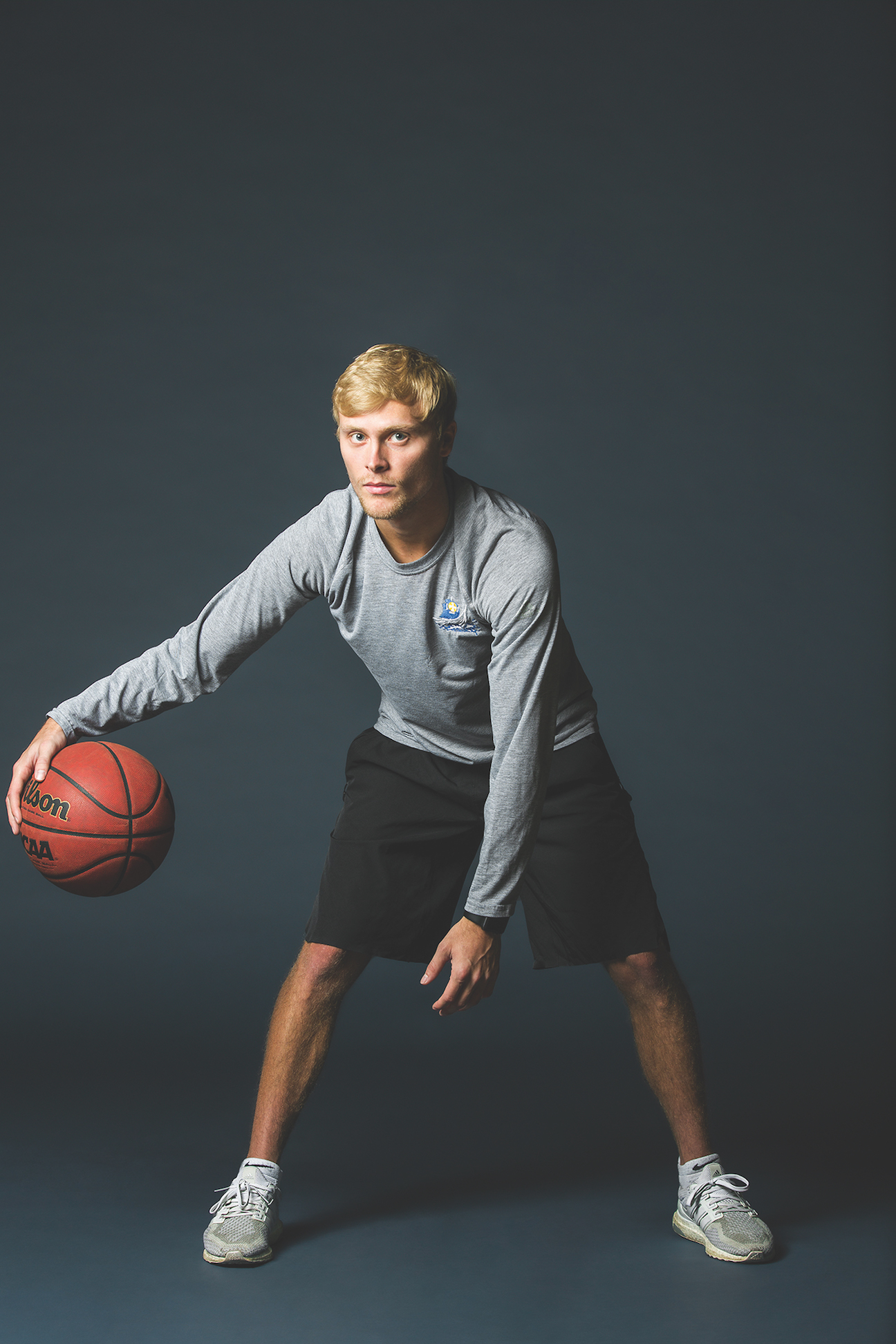
Temperance, MI
Business and Economics Major
Michigan native Colin Lake might not be too tall for a basketball player (he stands about 5’7”), but the impact he made during a game last year against rival Illinois Wesleyan left a huge impression on a former Chicago Tribune sports writer in attendance.
The reporter, a former colleague of ��ݮӰ�� Board Chair Owen Youngman C’75, told Youngman he had been reluctantly dragged to the game by his family.
“But my reward was seeing the best performance I have ever seen on a basketball court at any level,” the reporter says of Lake’s 46-point performance. “Down the stretch, he was repeatedly hitting shots from beyond the NBA 3-point line, getting hammered when he drove to the basket and either making his layup or getting up and sinking free throws.”
Lake shrugs off the praise, saying his first priority was always having a high GPA. And his parents? They’re happy he landed a job after graduation at a suburban marketing firm.
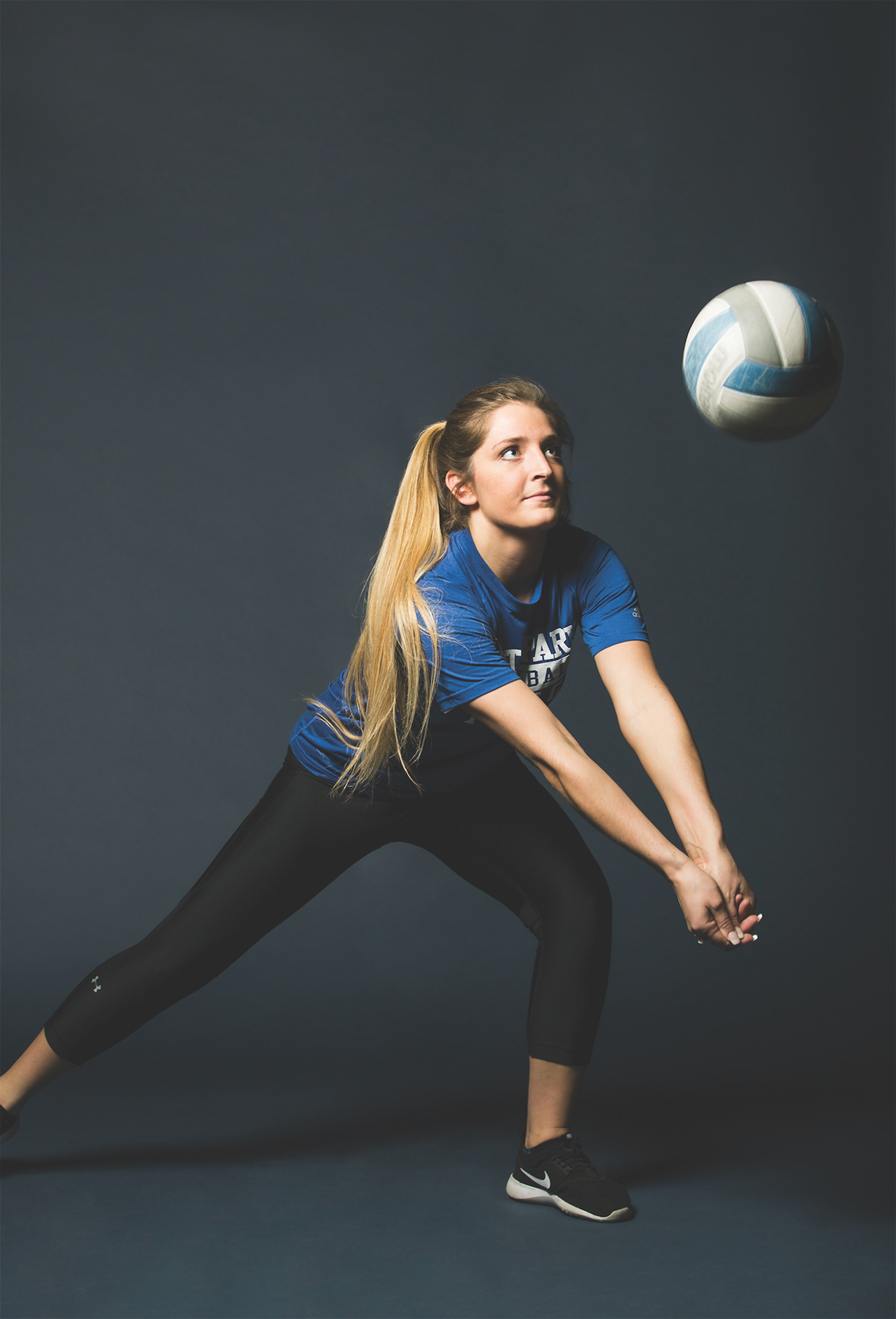
Elgin, IL
Exercise Science Major
Lauren Wiltsie C’19 cherishes the closeness of ��ݮӰ��’s entire athletic community.
“Seeing everyone in the athletic training room and in the gym, we all get along. And it’s fun talking to other athletes and supporting them at their game,” says Wiltsie.
The exercise science major says most of the volleyball team has played together since freshman year. They will go into senior year as a solid, cohesive unit that will settle for nothing less than a CCIW championship.
“It’s going to be our year,” says Wiltsie.
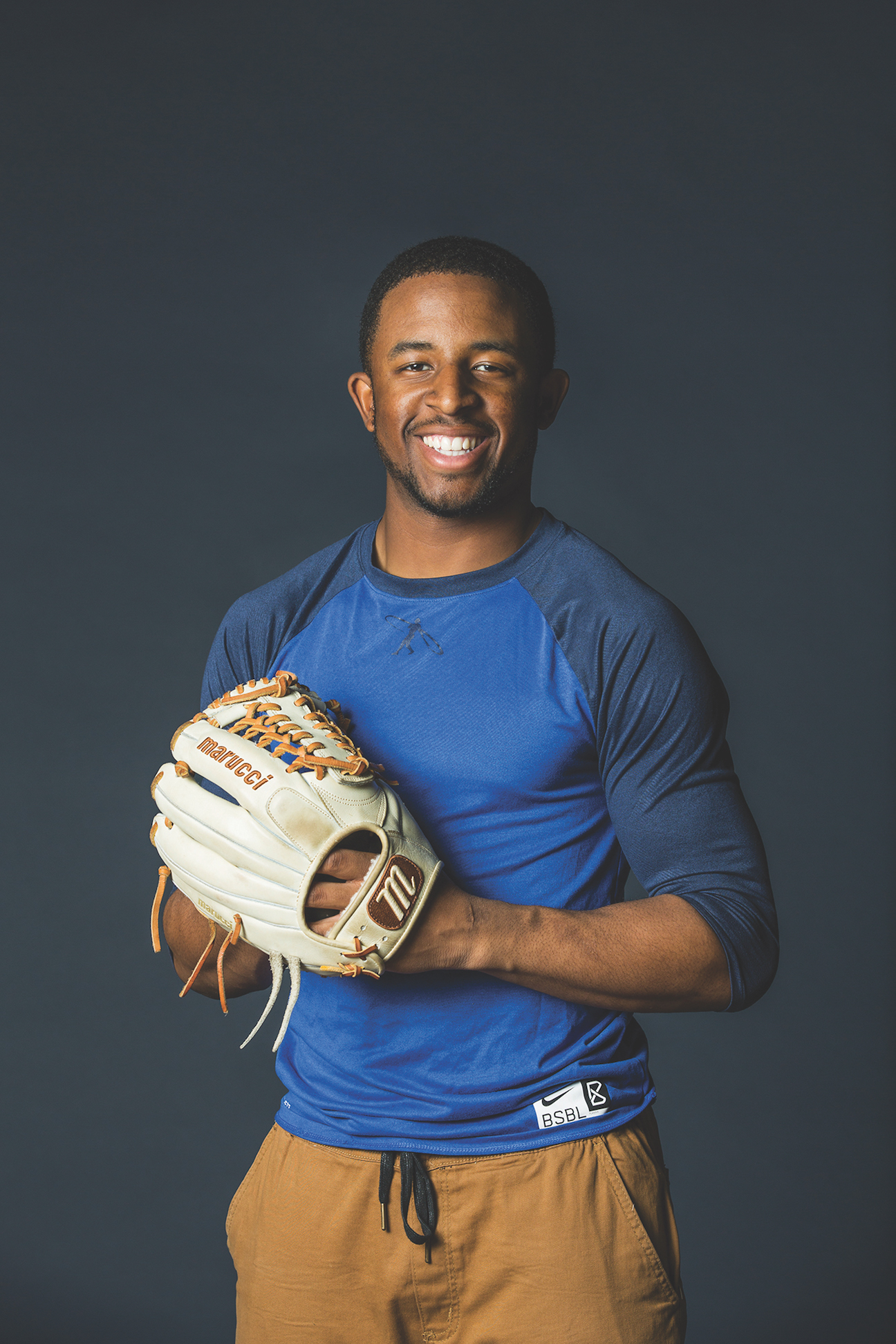
Bolingbrook, IL
Exercise Science Major
For Michael Freeze C’20 ��ݮӰ�� is a perfect fit: A Christian institution in Chicago that was small enough to help him thrive as a student and an athlete.
“My coaches push for excellence on and off the field,” says Freeze, who eventually plans to pursue a master’s in exercise science.
Although he says it can be tough juggling classwork and practices, plus his duties as a resident assistant and student ambassador, his coaches and professors provide strong support, as has the discipline of playing baseball.
“Sports have helped me to understand how to hold it together when I face adversity, and also how to remain grounded and humbled in times of success,” Freeze says.


